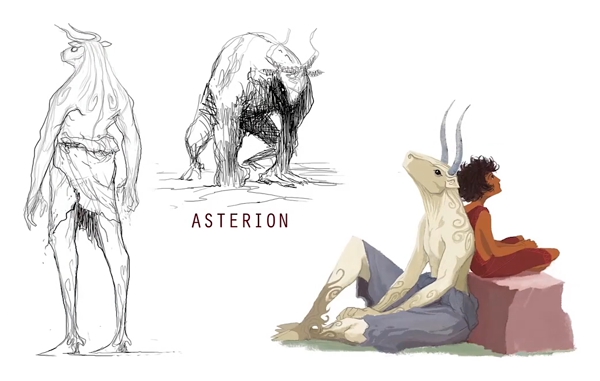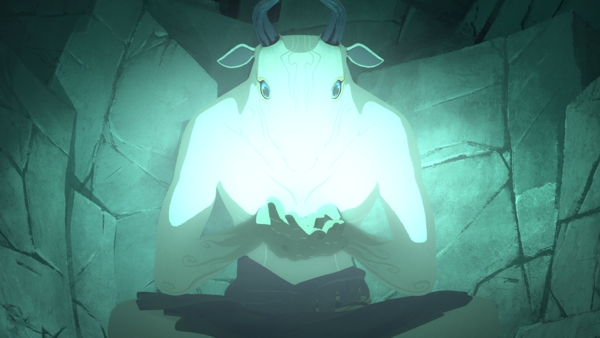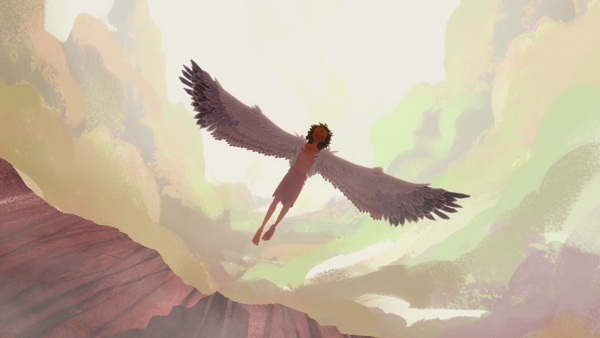Movie review: 'Icare' ('Icarus')
 When discussing modern adaptations of classical Greek myths, you can frequently see people complain about the changes the authors made: "That's not authentic, not traditional; that's not what really happened in the original." In fact, reinterpreting old stories, giving them a new, contemporary meaning, weaving several different tales into one - is the truest, most authentic Ancient Greek tradition. That's what Greek (and, later, Roman) writers always did.
When discussing modern adaptations of classical Greek myths, you can frequently see people complain about the changes the authors made: "That's not authentic, not traditional; that's not what really happened in the original." In fact, reinterpreting old stories, giving them a new, contemporary meaning, weaving several different tales into one - is the truest, most authentic Ancient Greek tradition. That's what Greek (and, later, Roman) writers always did.
Of course, some older texts - Homer, in the first place - were regarded higher than others, but there was no 'canon', no Old Testament; no single authority on what 'really happened'. In one of Euripides' tragedies, Helen of Troy is a callous, cynical adulteress; in another by the same poet, she's a woman of the highest moral qualities who's never even been to Troy. That's because, when writing these two plays, Euripides set very different tasks before himself.
'Icare' (2022) is a French-language feature film mixing 2D and 3D animation. It was made by Luxembourg studio The Iris Group, directed and co-written by former Pixar employee Carlo Vogele. The movie was the Luxembourg's "Best Foreign Film" submission for the 2023 Oscars. It tells the story of Icarus, son of the illustrious artist and inventor Daedalus, entwining it with another famous Cretan myth - that of Asterion ("stellar", "star-like"), more commonly known as the Minotaur.
From watching the trailer, you might think that it's a simple subversion: now the bad guy is the good guy, and vice versa. To a certain degree it's true, but here's the trick: while indeed subverting standard expectations, the movie keeps extremely close to the most "standard" versions of the events concerning its characters - Icarus, Asterion, Daedalus, Asterion's stepsister Ariadne, King Minos, Queen Pasiphaë and the Athenian hero Theseus. In fact, I know few films based on Greek mythology (both animated and live-action) with such reverence to their ancient sources.

Yes, the movie begins with Pasiphaë falling madly in love with a beautiful, snow-white divine bull. Yes, Daedalus builds a hollow wooden cow so that the queen may have sex with the animal, and Pasiphaë gives birth to the Minotaur. Yes, Minos will hate both his perverted wife and her monster bastard son and will incarcerate the latter into the Labyrinth designed by Daedalus. And Athenians will murder Androgeus, the elder son of Minos from his previous wife, and Minos will hate Athenians and seek revenge. And Theseus, aided by love-smitten Ariadne, will enter the Labyrinth and kill the beast in a brutal fight. Then Theseus will set sail back home and, mid-way, dump now-useless Ariadne on the island of Naxos.
 After that, Minos will hate Daedalus and Icarus. (Did you notice the pattern? Note: Minos is a mythical ruler famous for his wisdom and justice.) The king will imprison the father and the son in the same Labyrinth. They'll escape using wings held together by wax, Icarus will fly too close to the sun and - well, you know what happens next.
After that, Minos will hate Daedalus and Icarus. (Did you notice the pattern? Note: Minos is a mythical ruler famous for his wisdom and justice.) The king will imprison the father and the son in the same Labyrinth. They'll escape using wings held together by wax, Icarus will fly too close to the sun and - well, you know what happens next.
Also, King Minos himself, in full accordance with classical myths, is not what you would call a faithful husband, seeking pleasure with his young serving-men (Crete was considered one of the ancient centers of male love). By the way, did I mention that 'Icare' is a kid-friendly movie?
Miraculously, it is. This is a family film advertized as '6+'. All the "adult" themes are heavily hinted at, but never shown explicitly. Many things happen off-screen, much is said between the lines.
Kids can watch it - and, while not understand everything, still enjoy a kind-hearted and tender tale about loneliness, and relationships with your parents, and friendship. Some of them will probably cry. But we show kids Bambi and The Lion King, don't we?

Though the boy Icarus is the protagonist, his friend, Asterion the half-bull, is the heart of the movie: strong, gentle, sad, contemplative, loveable; possessing, as a creature of divine origin, a gift of prophetically seeing the future and telepathic mind-speech. (This one is not from the myths. Still, a great idea.) On IMDb, a reviewer says that, after seeing 'Icare,' their son asked for an Asterion plush.
For adult viewers familiar with the story, who, like Asterion, already half-know where everything is going, it's akin to watching 'Oedipus the King': the characters seem trapped by fate. Almost everything will happen as you expect - but you won't feel about it as you expect. The plot events are basically the same as 2500 years ago; then why does it seem a total subversion?
Because we are not the same as 2500 years ago. The old story stays as it was, but we change. And we're constantly building new bridges connecting the fixed past with the ever-moving present. 'Icare' is one of them.
 For those with a deeper interest in Ancient Greece, the movie offers many wonderful details. The bronze statue made by Daedalus in the beginning is a scaled-up version of a "snake goddess" from Knossos; the episode with Theseus and the ring of Minos is taken from a dithyramb by Bacchylides; Pasiphaë looks like women from Minoan frescoes; the designs of the buildings and the interiors are informed by real Cretan archeology; we even get a look at Ariadne's sumptuous dancing-floor mentioned in The Iliad at the end of book XVIII. The story of Daedalus putting a string through a seashell is rather little-known - but it fits well beside the more famous story of putting a thread through the Labyrinth. There are labryes, and tripods, and references to bull-leaping, and whatnot. Catasterism - posthumously ascending to the sky and being turned into a star or a constellation, a common mythological trope - doesn't originally feature in the story of Asterion, but it fits here, too: it's already in his name.
For those with a deeper interest in Ancient Greece, the movie offers many wonderful details. The bronze statue made by Daedalus in the beginning is a scaled-up version of a "snake goddess" from Knossos; the episode with Theseus and the ring of Minos is taken from a dithyramb by Bacchylides; Pasiphaë looks like women from Minoan frescoes; the designs of the buildings and the interiors are informed by real Cretan archeology; we even get a look at Ariadne's sumptuous dancing-floor mentioned in The Iliad at the end of book XVIII. The story of Daedalus putting a string through a seashell is rather little-known - but it fits well beside the more famous story of putting a thread through the Labyrinth. There are labryes, and tripods, and references to bull-leaping, and whatnot. Catasterism - posthumously ascending to the sky and being turned into a star or a constellation, a common mythological trope - doesn't originally feature in the story of Asterion, but it fits here, too: it's already in his name.
'Icare' is a highly unusual movie. Not for everyone - certainly not for those who seek comedy or action: it's serious and dialog-driven. Its simplistic visual style looks a bit crude. The soundtrack, for some odd reason, heavily uses music by Vivaldi, bringing to mind numerous Baroque operas and oratorios on mythological subjects - other, former bridges from present to past.
But I'm glad I watched it. It's strange and beautiful.


Comments
I've got a good excuse for being quiet recently - I've been working on an English fansub of Icarus! A friend of mine had found a pirated copy for me earlier this year, but without subtitles. (From the Usenet binary groups? Are those still a thing??) So - I ordered a legit copy, a DVD from France. It came with French subtitles for the deaf and hard-of-hearing. After technical shenanigans to get those into a form I could work with, it took about a month to translate them into English and fix the timing issues.
It turns out that most of the adult characters in Icarus engage in verbal sparring with one another, using unnecessarily florid and overly-loquatious vocabulary, and they speak really quickly too. And since I'd often have only 2.4 seconds before the next line of dialog, I ditched trying to provide a literal translation and opted to go for the basics. As a result, there's a lot of nuance lost, but the general sentiment of the speech has been preserved.
It also didn't help that whoever was in charge of creating the DVD transfer in France forgot that while films run at 24 frames per second, PAL-region DVDs run at 25 frames per second, so this 4% difference means that the French DVD finishes three minutes faster than it should.
I really liked watching this one, a lot, even though it's a tragedy and despite having a very dysfunctional royal family. If you can somehow get your hands on a copy, it's highly recommended!
Problem is, the film itself still seems to be generally unavailable. Apple TV+ and Amazon Prime Video have it - but only for customers with IP addresses in France. Anyway, if you want the subtitles, they can be downloaded here from opensubtitles.org - just make sure you've got ad-blockers, and don't get tricked into installing any of their crap. The one you probably want is the 720p / 24fps English file. Click on "Download" to get the zip file; do not click on "Download (beta)".
Carlo Vogele is now working on his second feature film - a more "furry" one, set in a society of talking animals.
I'd also like to recommend his 4.5-minute stop motion short, For Sock's Sake.
That sounds about as furry as it gets!
Keep us informed, and great job on the review, btw (should've said so back in September). Of course, I originally suggested you might take a swing, so I will take full credit (no, but seriously, thanks for doing it)!
If it was "as furry as it gets" then where's the real life animal boning?
He animated For Sock's Sake? I saw that at an animation festival ages ago! I used to have a tiny 240-pixel high copy on my hard drive. Thanks for reminding me of this!
Icarus has gotten a Blu-ray disc with a (British) English dub... released in Spain? Well, if you want a legit copy, finally there's an option! For affordability, I'm still hoping that one day it'll show up on streaming services. No luck there yet, at least according to JustWatch. Thankfully I was able to buy a French DVD, but that was hard enough to understand.
Anyway, now there's also a torrent available, but should you get the chance, this is a film worth supporting. There's a short bit of introductory text in Spanish at the start, before the English dialog kicks in, but it's nothing earth-shattering. ("In the age when King Minos rules Crete, mankind worships and fears the Gods of Olympus. Only a fool would dare to offend them.")
Post new comment